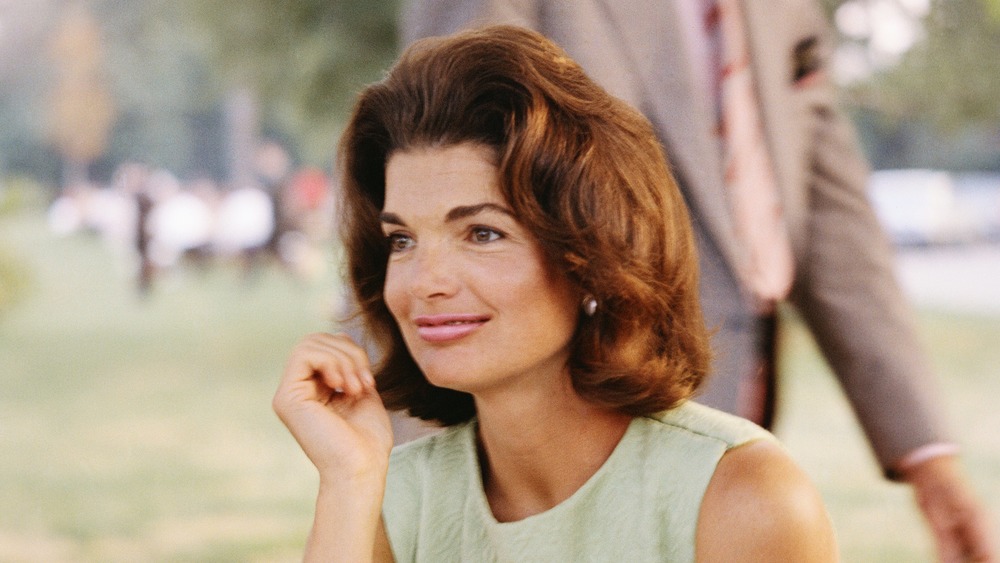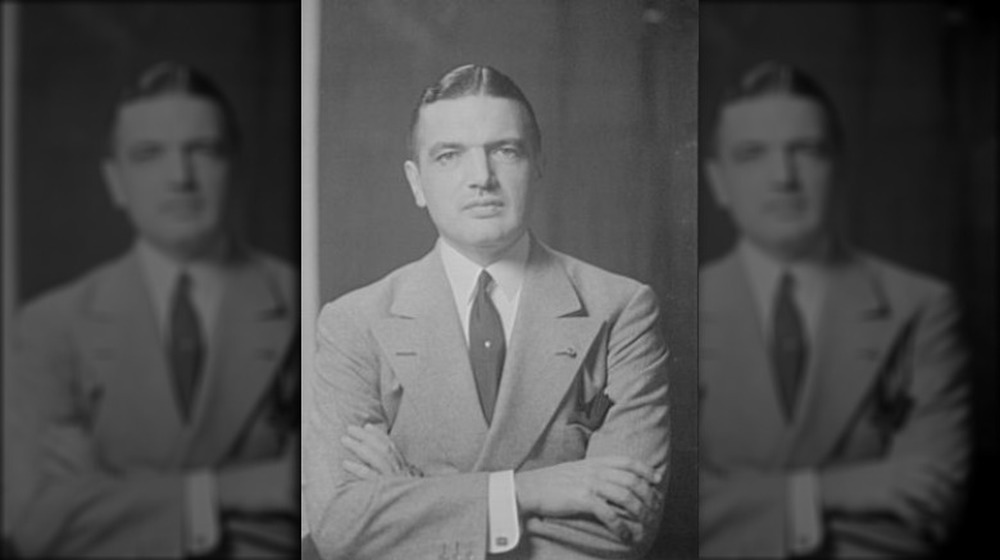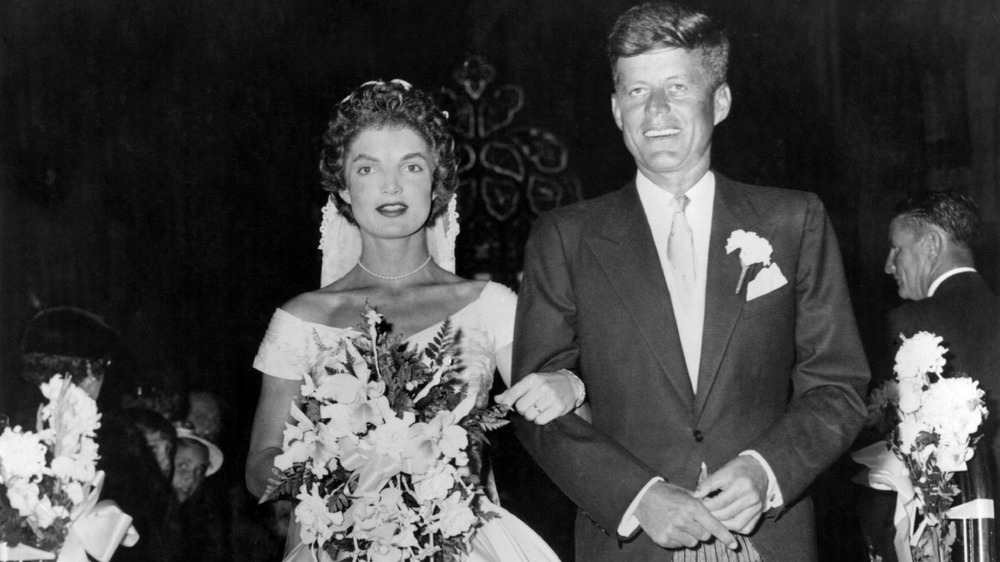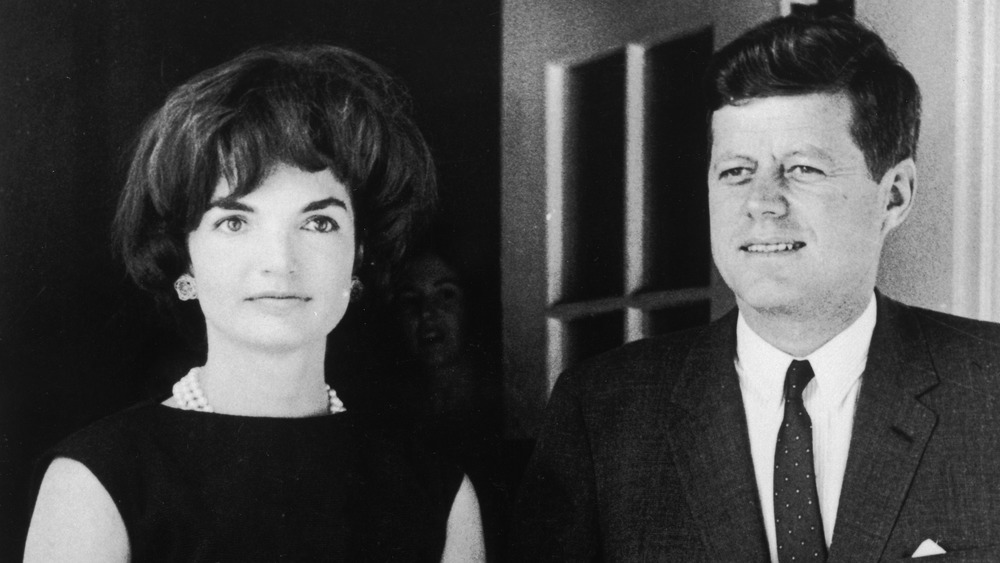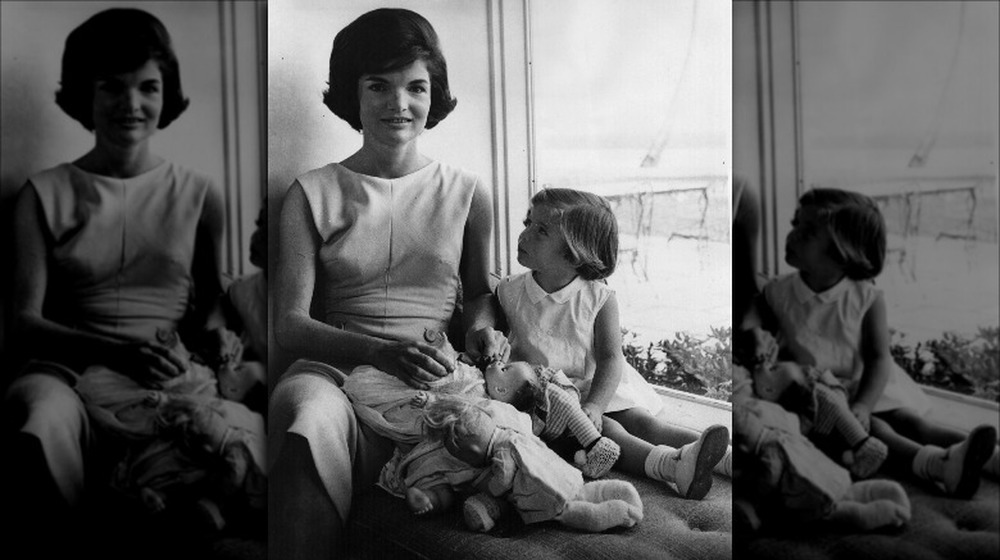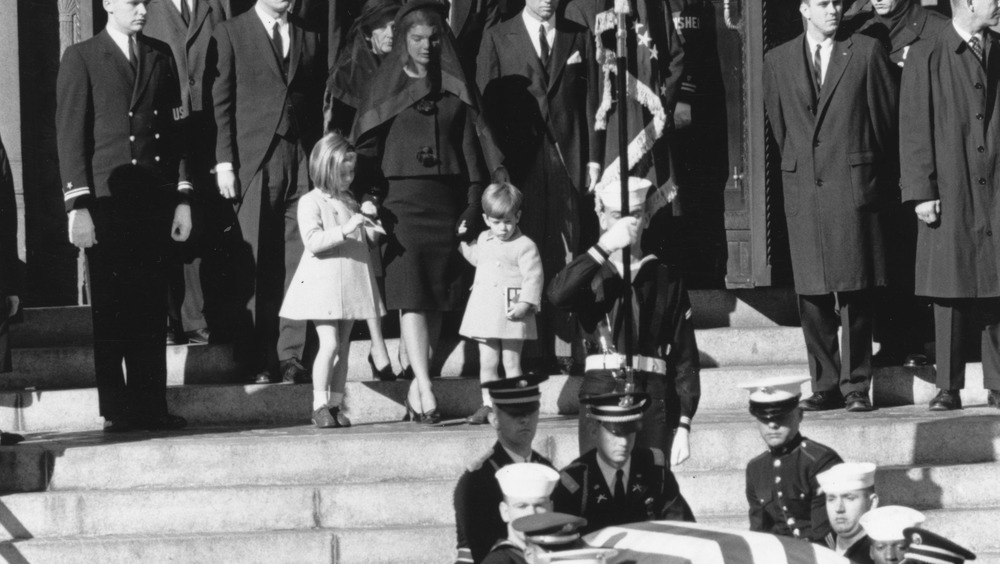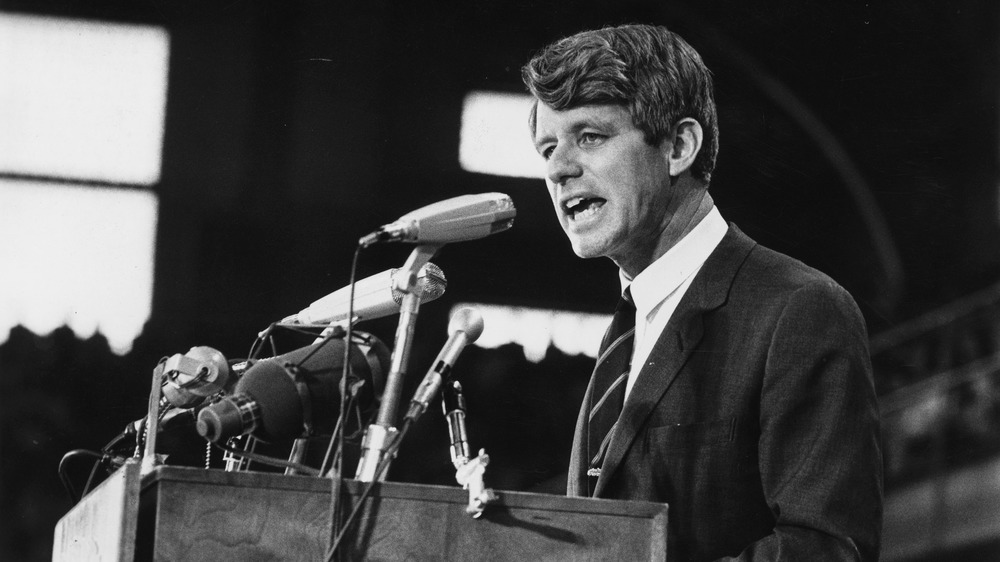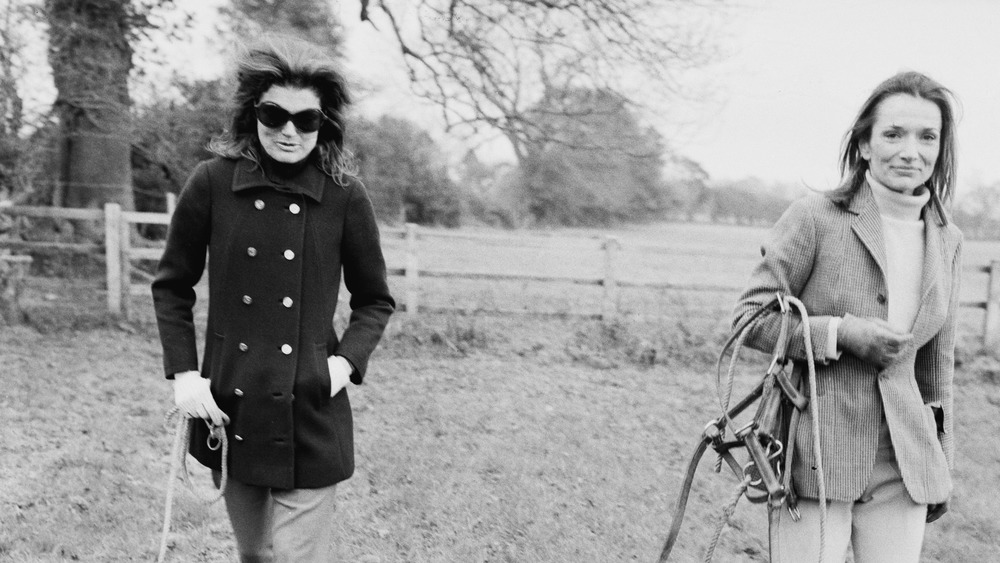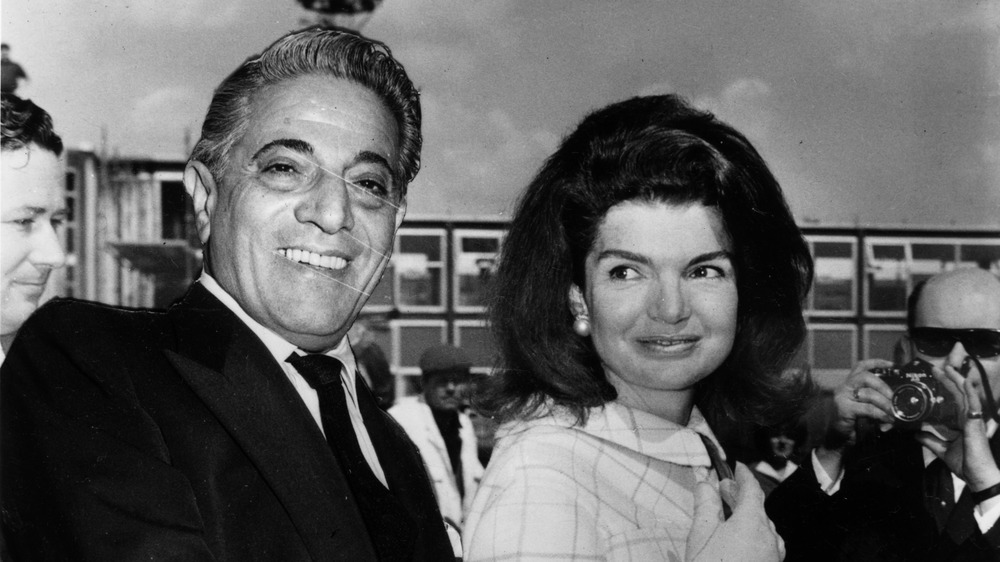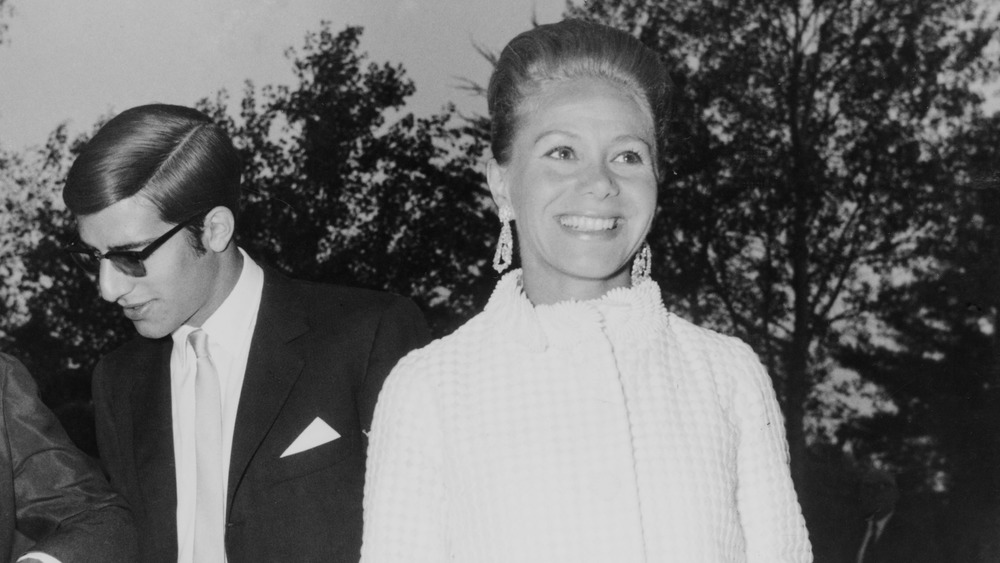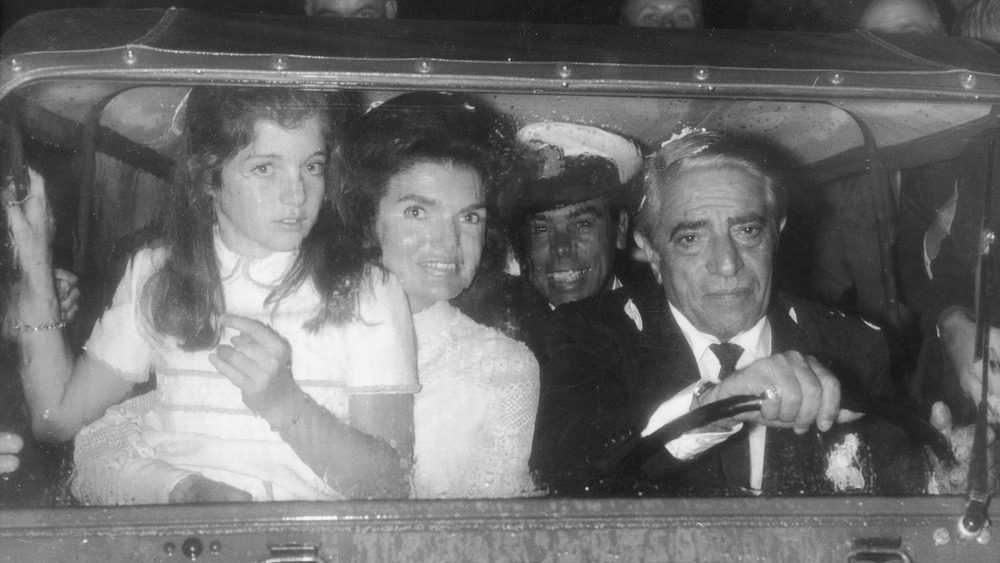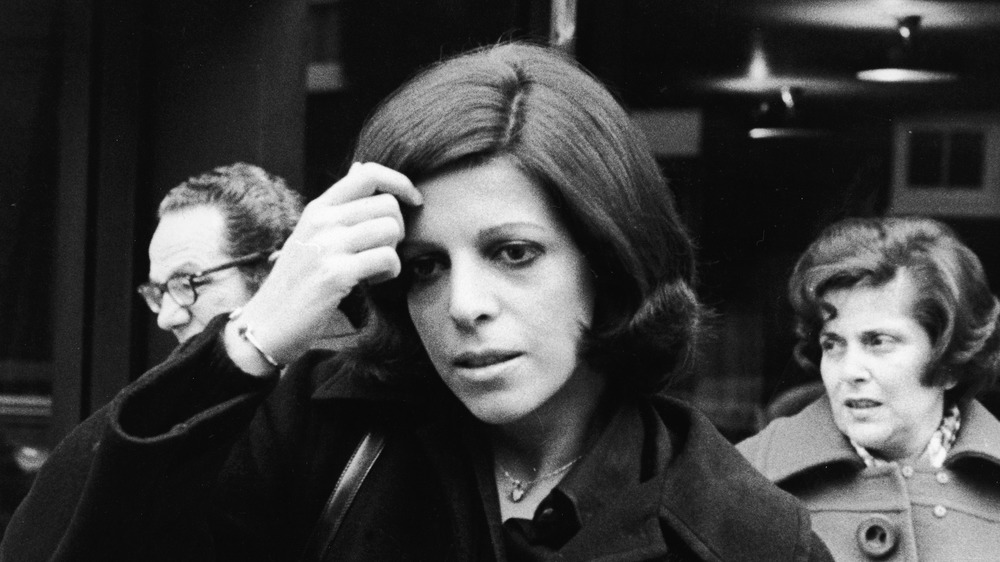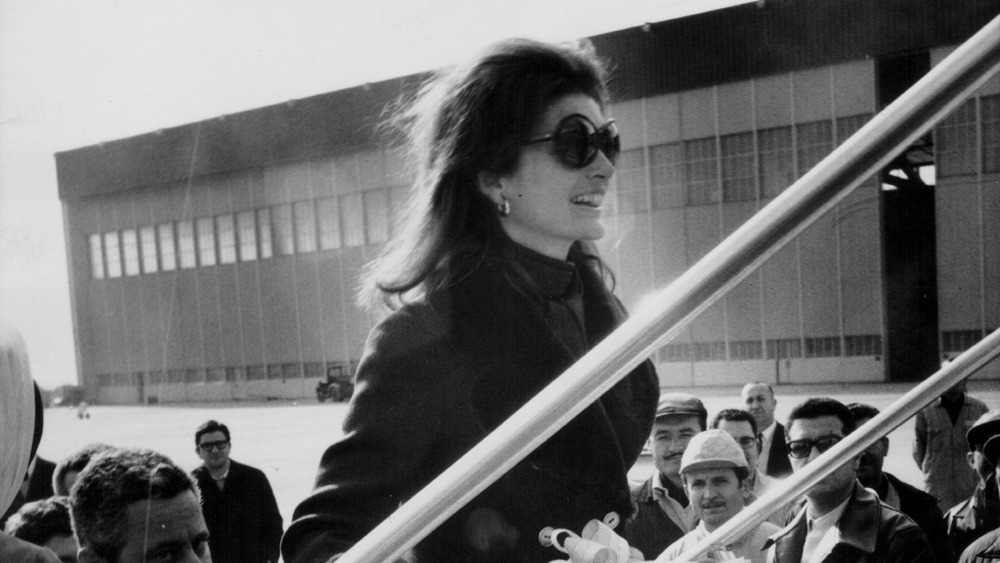The Tragic True Story Of First Lady Jacqueline Kennedy
With recognizable monikers like Jackie Kennedy or Jackie O, Jacqueline Kennedy Onassis remains one of the most iconic figures in recent history. Per History, after first being a part of public consciousness as the wife of up-and-coming senator John F. Kennedy, Jackie was soon thrust into the spotlight when her husband became president of the United States in 1960. According to The Washington Post, she was famous for her style, grace, and elegance, becoming an icon who elevated the significance of her role. As first lady, she restored the White House to fit her sophisticated tastes with historic art and furnishings and, after the assassination of her husband, was revered for her composure and devotion to her children. She later would marry again to one of the richest men in the world, Aristotle Onassis, and then return back to her hometown of New York City to have a successful career in publishing.
Despite her glamorous and admired legacy, though, Jacqueline Kennedy Onassis' life was filled with an overwhelming amount of complications and loss. Some horrors, like the death of her husband, have been well-documented and are widely remembered today. Other sad aspects of her life, however, may have been shrouded by her shining image as an international icon. But, ultimately, beneath the famous society figure was a woman who had been through a lot. Here is the tragic true story of first lady Jacqueline Kennedy.
Jacqueline Kennedy's father had some serious vices
Born to socialite Janet Lee and stockbroker John "Black Jack" Bouvier, III, on July 28, 1929, Jacqueline "Jackie" Bouvier grew up in New York City, spending her summers on her family's country estate on Long Island, as described by Captivating History. An intelligent and talented young girl, her childhood was unfortunately riddled with family drama.
Her father, "Black Jack" Bouvier, was notorious for being a gambling, womanizing alcoholic. According to The Rake, his gambling habits resulted in him being expelled from prep school and even losing all of his money during his honeymoon with Lee. His womanizing ways never stopped with marriage, and he quickly attained a reputation for cheating on his wife. In 1936, the couple separated, prompting the press to publish the details of all of Bouvier's affairs. By 1940, Janet Lee and John Bouvier divorced, leaving Jackie Bouvier with two parents who hated each other.
Despite his vices, though, Jackie and her sister, Lee, both adored their father. In an interview with T Magazine, Lee said, "One thing which infuriates me is how he's always labeled the drunk black prince. He was never drunk with me..." Perhaps, his alcoholic reputation came from the infamous story of how, at Jacqueline's wedding to JFK, he was too drunk to walk her down the aisle. According to Lee, though, it was a result of her parents' feud, with John drinking from "misery and loneliness" after Janet blocked him from attending a family dinner the night before.
Jacqueline Kennedy's marriage to JFK was no fairy tale
The Kennedys can arguably be considered one of the most iconic couples in history. Wildly famous public figures of their time, their popularity also meant that their private lives weren't so private. Their marriage was known to have been a tumultuous one, complicated by an assortment of issues. Notoriously, John F. Kennedy was rumored to have had countless affairs and has been linked to some notable figures such as "Marilyn Monroe, Marlene Dietrich, Blaze Starr and more screen stars," according to AOL. There were also arguments over Jackie Kennedy's lavish spending and clothing bills ("Nixonites accused her of spending $100,00 on her wardrobe"), as told by TIME. Apparently, things got to the point where Jackie's father-in-law, Joseph Kennedy, had to offer her $1 million to stay in the marriage, which she reportedly accepted.
A key element of their marriage that drained Jackie, though, was her husband's political ambitions. An immensely private person, she somehow ended up marrying a man who loved the spotlight and was determined to become president. But even though Jackie disliked the White House and the fact that she had to raise her kids in the eye of the public, she conquered the challenges with style. When JFK was a senator, Jackie's remoteness and "snooty" attitude were considered a liability to his campaign. As first lady, though, she became one of the nation's greatest assets, charming other parties on various diplomatic trips with the president.
A miscarriage and a stillborn baby
According to HuffPost, Jackie Kennedy did not have it easy with her pregnancies. Jackie married John F. Kennedy in 1953 and, about two years later, the couple was expecting their first child. Sadly, Jackie's first pregnancy in 1955 ended in a difficult miscarriage after just three months, with Jackie learning from the experience that "carrying and delivering a child would always be difficult for her."
Months later, she became pregnant again, but tragically, that one wouldn't end well either. A month before her due date, Jackie woke up the morning of Aug. 23, 1956, screaming for her mom. She had lost a lot of blood, and later, ended up giving birth to a stillborn baby.
Apparently, her husband's initial reaction to the incident exposed his inconsiderate side. JFK was sailing around the Mediterranean on a yacht with a bunch of friends when his wife suffered from hemorrhaging and the stillbirth of their child. Rather than rushing back to be by his wife's side as soon as he heard the news, it took a few words from his friends to make him realize how bad his absence would look to the public. George Smathers is reported to have told the then-senator, "You better haul your a** back to your wife if you ever want to run for president."
Jacqueline Kennedy's newborn baby boy, Patrick, passed away
After two difficult pregnancies, Jackie Kennedy's third thankfully finished with her successfully giving birth to a healthy baby girl named Caroline in November 1957, as described by HuffPost. Three years later, on Nov. 25, 1960, the Kennedys welcomed their son, John F. Kennedy, Jr., who, despite being born three weeks early and having some initial respiratory issues, would grow up healthily.
However, Jackie's fifth and (publicly) final pregnancy would once again prove tragic. Once again, she went into labor early — five and a half weeks, to be exact. After being flown in by helicopter to the hospital at Otis Air Force Base, Jackie gave birth to a tiny, barely 4.5-pound baby boy named Patrick. Unfortunately, the newborn was struggling with hyaline membrane disease and had a lot of difficulty breathing. The Kennedys, along with the nation, anxiously waited for his condition to improve, with the Boston Globe even running the headline, "He's a Kennedy – He'll Make It." Sadly, efforts at saving Patrick proved unsuccessful, and the newborn baby boy would pass away only 39 hours later on Aug. 9, 1963.
The assassination of John F. Kennedy
The death of their newborn son, Patrick, brought the president and first lady closer than before, as observed by those around them (via HuffPost). Regrettably, the effects of how the loss transformed their relationship were unable to be fully observed, as just three months later, the Kennedys were due for a trip to Dallas in November 1963.
On Nov. 22,, 1963, President John F. Kennedy and first lady Jacqueline Kennedy were riding in a convertible, waving to cheering crowds, when the president was assassinated by gunman Lee Harvey Oswald, as described by Biography. Secret Service agent Clint Hill described in his memoir how Jackie "held her husband in her arms shouting, 'Jack, Jack, what have they done to you?'" and refused to let go and have the crowd see him dying (via Business Insider). Chillingly, Jackie is also known to have reached out to grab a piece of his head that had landed elsewhere. As quoted in TIME, Dr. Marion Jenkins remembers how Jackie "nudged me with her left elbow and then with her right hand handed me a good-sized chunk of the President's brain. She didn't say a word."
Clutching her husband, Jackie's pink suit had become drenched with blood, which she refused to change out of. According to Biography, she wiped her face of the blood but even regretted that, saying, "I thought, 'Why did I wash the blood off?' I should have left it there; let them see what they've done."
Jacqueline Kennedy's brother-in-law, Robert F. Kennedy, was also assassinated just a few years later
In the immediate years after the death of her husband, Jackie Kennedy lived a quiet life with her children. Initially living in Georgetown, she moved her family to New York City for its "anonymity and familiarity," after the Washington, D.C., home failed to provide her with the privacy she desired, according to TIME. She came out of her reclusive lifestyle to help her brother-in-law Robert F. Kennedy with his presidential campaign.
However, as ThoughtCo describes, on June 5, 1968, just after midnight, Robert Kennedy was shot three times after his speech at a hotel in Los Angeles. According to Vanity Fair, when Jackie's brother-in-law, Stas Radziwill, called her at 4 a.m. asking how RFK was, she had no idea of the incident, telling him that Robert was fine and had just won California. Radziwill had to break the news to her and, once again, Jackie was "plunged into grief" by the loss of another person close to her. This second Kennedy assassination made her start to fear for kids' safety as well. Jackie reportedly told a friend, "They're killing Kennedys in America."
Jacqueline Kennedy had a complicated relationship with her sister Lee
The Bouvier sisters, Jacqueline and Lee, were a glamorously famous pair who always had a complex relationship, according to Vanity Fair. Growing up with divorced parents, they relied on each other immensely, but a sibling rivalry would persist throughout their lives. When Jackie married John F. Kennedy, she ascended to the center of the public eye, while her equally talented sister became at risk of being eclipsed entirely. A pattern began to emerge during Jackie's reign as first lady. Wanting her sister there for support, Jackie would ask Lee to accompany and help her during various trips. But the media attention was always on Jackie, who would ironically be praised for her fashion sense even when it was her sister who was instrumental in selecting her wardrobe.
Around this time, Lee's marriage to Stas Radziwell was breaking down, and she found herself charmed by the Greek shipping tycoon Aristotle Onassis. The Kennedys greatly distrusted Onassis, though, and disapproved. After the death of her newborn, Jackie was invited to go on a cruise with the couple, during which she took the opportunity to convince Lee not to marry Onassis. However, the trip seemed to be the starting point for a future development. About five years after the assassination of JFK, it was Jackie who married Onassis in October 1968. Lee was reported to have felt betrayed and devastated. While she publicly wished them well, the sisters' relationship would never fully recover.
Another marriage full of affairs and quarrels
Jacqueline Kennedy's marriage to Aristotle Onassis came as a shock to the public. This was partly because of how quickly it came about (only a few months after Robert Kennedy's assassination) and partly because of his less-than-stellar record (Onassis had been sued and fined by the U.S. government in 1955), according to Vanity Fair. The two also had practically nothing in common, not to mention that Onassis was 23 years her senior. As told by History News Network and Vanity Fair, it became apparent that the marriage was less based on love and more on benefits. Jackie Kennedy desired the stability and lavish life that the Onassis fortune could provide, while Onassis saw the world-famous former first lady as the "ultimate trophy."
Unfortunately, the incompatibility of the couple quickly had Onassis starting up his long-time affair with opera diva Maria Callas again only a month after the wedding. The couple would also get into arguments about Jackie's spending. History News Network claims that Jackie always had a "Class A shopping addiction, with roomsful of purchases at her Fifth Avenue apartment that she never even removed from their boxes." Eventually, the shipping tycoon took up distastefully referring to his wife as "the widow," according to TIME.
The death of her stepson and Onassis' ex-wife
According to History News Network, Jacqueline Kennedy's surprising marriage to Aristotle Onassis may have been one way in which she sought a new beginning, to get away from being "placed on a pedestal as America's grieving widow." But her hope for a smooth-sailing life didn't seem to last. In January of 1973, as reported by The New York Times, Alexander Onassis, Aristotle's only son and Jackie's new step-son, died of a brain hemorrhage after he was involved in a plane crash at Athens airport. Alexander's death, which came when he was only 24 years old, broke his father's heart and led Ari to go from calling Jackie "the widow" to calling her "the witch," per TIME. Superstitiously, the shipping magnate blamed his wife and her pattern of tragedy for the loss of his beloved son.
Then, just a little over a year later, Tina Niarchos, Alexander's mother and the ex-wife of Aristotle Onassis, passed away at the age of 45 in October 1974, according to The New York Times. While there were initially conflicting reports about how she died, it is suspected to be of a "suspected overdose of barbiturates," as told by Vanity Fair in a 2008 article.
Jacqueline Kennedy widowed for the second time
The early 1970s once again saw Jacqueline Kennedy Onassis suffering loss after loss. In March 1975, after less than seven years of marriage, her husband Aristotle Onassis passed away from bronchial pneumonia, according to The New York Times. He had been in the hospital for five weeks undergoing a gall bladder operation, as well as under observation for myasthenia gravis, "a debilitating neurological disease, which had affected his heart." The cortisone treatment he was receiving had weakened his immune system, resulting in the pneumonia's fatal effects. His death came just two years after the death of his son Alexander and a few months after his ex-wife's passing (via The New York Times).
Shortly after, it came out to the press that Aristotle had been planning to divorce Jackie, with the shipping tycoon consulting with his lawyer multiple times regarding the matter as recently as December 1974, as reported by The New York Times. Aristotle also apparently looked into having a private investigator dig up dirt on Jackie that could be used in the divorce proceedings. However, his daughter, Christina Onassis, denied the claims.
Jacqueline Kennedy's former stepdaughter died suddenly of a heart attack
The sudden death of those connected to her seemed to follow Jacqueline Kennedy. The back-to-back losses in the Onassis family even had some wondering whether she brought with her the infamous Kennedy curse when she married Aristotle Onassis. Even after her second husband passed away, and Jackie distanced herself from the family, tragedy still struck. In November of 1988, Christina Onassis, Jackie's former stepdaughter, died suddenly in Argentina, as reported by The New York Times. Only 37 years old, the cause of her death is said to have been a heart attack "brought on by years of drug abuse," according to Greek Reporter.
It was often reported that Kennedy had a strained relationship with her stepdaughter, with Christina seeing her new mother as a gold-digger and calling her "my father's unfortunate obsession." There were also rumors of the two disputing Kennedy's inheritance following Aristotle Onassis' death. In a 1975 statement, though, Christina insisted the stories were not true and that "her relations with her stepmother...were based on friendship and respect" (via The New York Times).
Diagnosed with cancer at the age of 64
According to The Washington Post, in January of 1994, Jacqueline Kennedy Onassis was diagnosed with non-Hodgkins lymphoma. Found mostly in her neck, chest, and abdomen, she began her chemotherapy sessions and was seeing optimistic progress in the beginning, as reported by The New York Times. In mid-March, however, she was experiencing pain throughout her legs, and it was found that the cancer, which affects the lymph system, had disappeared from its initial locations and spread to her brain and spinal cord.
By May, her health had worsened considerably. On May 16, she was diagnosed with and treated for pneumonia. Two days later, it was found that her liver had huge amounts of the lymphoma and that there was little that further treatment could do. Not wishing to spend her last moments at a hospital, Jackie Kennedy Onassis was released. On May 19, 1994, she passed away late at night surrounded by her family and friends at her home in Manhattan at the age of 64.
